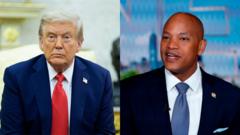Trump's latest clash with Maryland Governor Wes Moore took a dramatic turn when he proposed sending troops to Baltimore to combat crime. Moore extended an invitation to Trump for a "safety walk" in the city, which Trump dismissed as “nasty” and “provocative.”
“If Wes Moore needs help, like Gavin Newscum did in L.A., I will send in the 'troops,'" Trump claimed on social media. His statement is part of an ongoing trend where he aims to deploy National Guard troops to various Democratic-led cities, framing it as a crime-fighting strategy.
The Democrat-led movement against the president's plan has intensified, with leaders labeling his actions as "an abuse of power.” Moore argued that Trump's comments were out of touch with community experiences and further pointed out that the administration's focus on crime does not reflect the realities of their streets.
Currently, around 1,700 National Guardsmen are expected to mobilize across 19 states, further stirring controversy. Trump’s Department of Defense stated troops in Washington D.C., previously unarmed, will soon carry weapons but have yet to engage in law enforcement actions.
Amid this drama, crime statistics in Washington D.C. reveal a downward trend, with a 26% decrease in violent crime this year compared to last. Despite this, Trump continues to advocate for increased military presence, even suggesting similar actions in cities like New York and Chicago.
As public opinion sways against military intervention in cities, with a recent poll showing nearly 80% opposition to troop deployments in Baltimore, the clash between local governance and federal power continues to intensify, showing no signs of resolution.
“If Wes Moore needs help, like Gavin Newscum did in L.A., I will send in the 'troops,'" Trump claimed on social media. His statement is part of an ongoing trend where he aims to deploy National Guard troops to various Democratic-led cities, framing it as a crime-fighting strategy.
The Democrat-led movement against the president's plan has intensified, with leaders labeling his actions as "an abuse of power.” Moore argued that Trump's comments were out of touch with community experiences and further pointed out that the administration's focus on crime does not reflect the realities of their streets.
Currently, around 1,700 National Guardsmen are expected to mobilize across 19 states, further stirring controversy. Trump’s Department of Defense stated troops in Washington D.C., previously unarmed, will soon carry weapons but have yet to engage in law enforcement actions.
Amid this drama, crime statistics in Washington D.C. reveal a downward trend, with a 26% decrease in violent crime this year compared to last. Despite this, Trump continues to advocate for increased military presence, even suggesting similar actions in cities like New York and Chicago.
As public opinion sways against military intervention in cities, with a recent poll showing nearly 80% opposition to troop deployments in Baltimore, the clash between local governance and federal power continues to intensify, showing no signs of resolution.




















